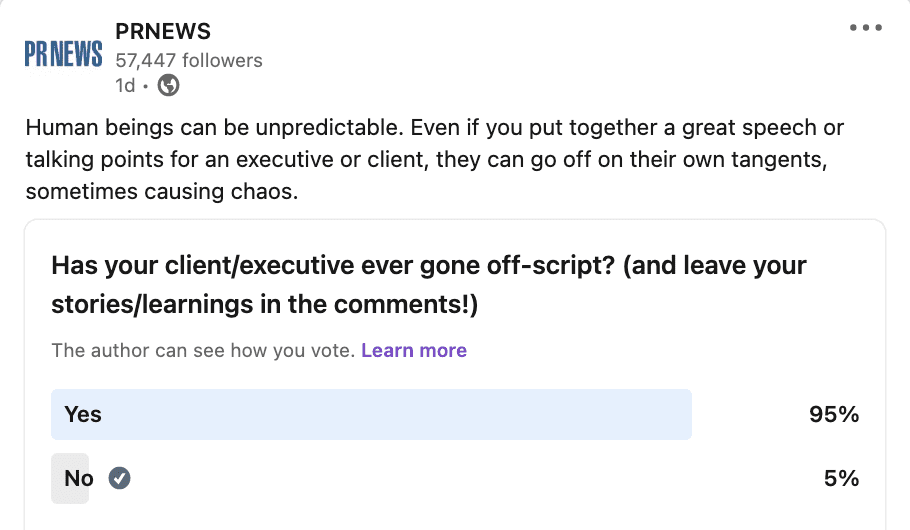
There’s no shortage of opinions these days. Podcast hosts, politicians, media pundits, TikTok stars, film stars, athletes—everyone has something to say, about everything.
And even for those who don’t have a celebrity status, digital platforms exist for anyone who wishes to share an idea or experience. Twitter used to be the preferred digital town square for sharing, but now users can go to YouTube or even LinkedIn to deliver expertise and viewpoints.
But with great reach comes great responsibility. And the public has seen its share of oversharing go badly. This includes CEOs, managers, and even brand social media accounts going rogue—a PR professional's worst nightmare.
Our latest PRNEWS poll asked our readers if they’ve ever dealt with a client or executive who has gone off-script. An overwhelming majority said yes.

This enforces the ideal that one of the basic skills for PR practitioners needs to be handling public discourse of an individual before, during and after an appearance—whether intended or not. PRNEWS asked several industry experts how they handle their clients.
Believing in the Message
John Guilfoil, Principal, JGPR, works primarily with government and law enforcement officials, some of whom are publicly elected. He notes that any public messaging is usually more about talking points than scripts.
“When the client lives and believes the message, the talking points should be enough for a good executive,” Guilfoil says.
Melanie McGovern, Director of PR and social media, International Association of Better Business Bureaus, Inc., agrees.
“We remind our local BBBs to avoid interviews that do not have anything to do with mission/vision, and that we are always available to help answer any questions they may have about a reporter inquiry.”
The Media Relations Pregame
McGovern also notes the importance of talking with a reporter, and what the gist of their story will be, before agreeing to any interviews.
“There are times when our local BBBs will get questions from journalists for which BBB is not the right source, in that case we refer them to other sources for the information,” she says. “We work as a team to create content in our newsfeed that has BBB information on a variety of topics, including tips that double as talking points.”
Jenny Wang, SVP, Clyde Group says practice sometimes makes perfect—but not always. Still providing some training is always better to educate those addressing the public, than none.
“Of course, prepping clients for potential questions and having mock interviews beforehand—as part of overall media training—is paramount, though it doesn't always prevent clients from going rogue,” Wang says.
McGovern also believes in professional media training for any organization or individual, which can also be useful to a journalists’ end product.
“It helps to keep focus on the question asked to avoid going off topic or on a tangent that has nothing to do with the interview,” she says. “It also saves the reporter time in the final edit process.”
When You See the Ship Going Down…
Preparation is essential, but, as Wang previously said, you cannot always prevent someone from going off-script in an interview.
In those cases, she says, it’s ok to step in and have everyone take a breather.
“If it's a media interview that a PR pro is staffing and a client is wading into territory that may be an issue, given the PR professional is staffing and coordinating the interview, they should feel free to step in and redirect/pivot the interview back on track,” she says.
However, she notes, it’s not as important for a client to deliver ideas verbatim to what has been previously decided on and discussed, but rather to keep the bigger picture in mind to help them to relax.
“For me, personally—I'm less concerned about clients saying points verbatim—rather, I emphasize, here are the three main points that are most important for you to make, and then I tell them it's good/okay for them to adlib a bit to make it sound less rehearsed/more authentic.”
Guilfoil says that for regulatory clients or agencies, when a client goes rogue, that can fundamentally change the story, with serious repercussions.
“Rogue words can become new policy,” he says. “In my line of work…the wrong words can become a lawsuit or can ruin a criminal investigation.”
Guilfoil says when a client goes off script, “you can either run with it, or you correct it immediately.” He used a national weather event as an example.
“In 2015, South Carolina Governor Nikki Haley was misinformed and misspoke to the press about hurricane evacuations, and it caused brief panic and uncertainty,” he says. “In that instance, the government and her staff had to correct the matter immediately, as lives were literally at stake.”
Wang says it’s also beneficial to follow up with clients after every public speaking event so they can learn and improve.
“It's critical to give feedback to the client after each interview or speech—more than just a simple recap, but truly constructive feedback on what could have been better and what went well.”
Nicole Schuman is senior editor for PRNEWS. Follow her @buffalogal
